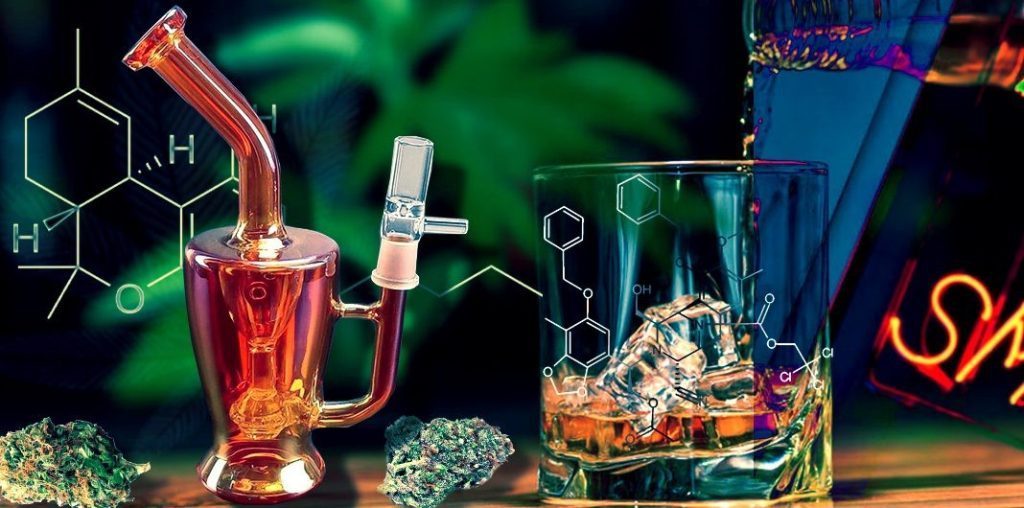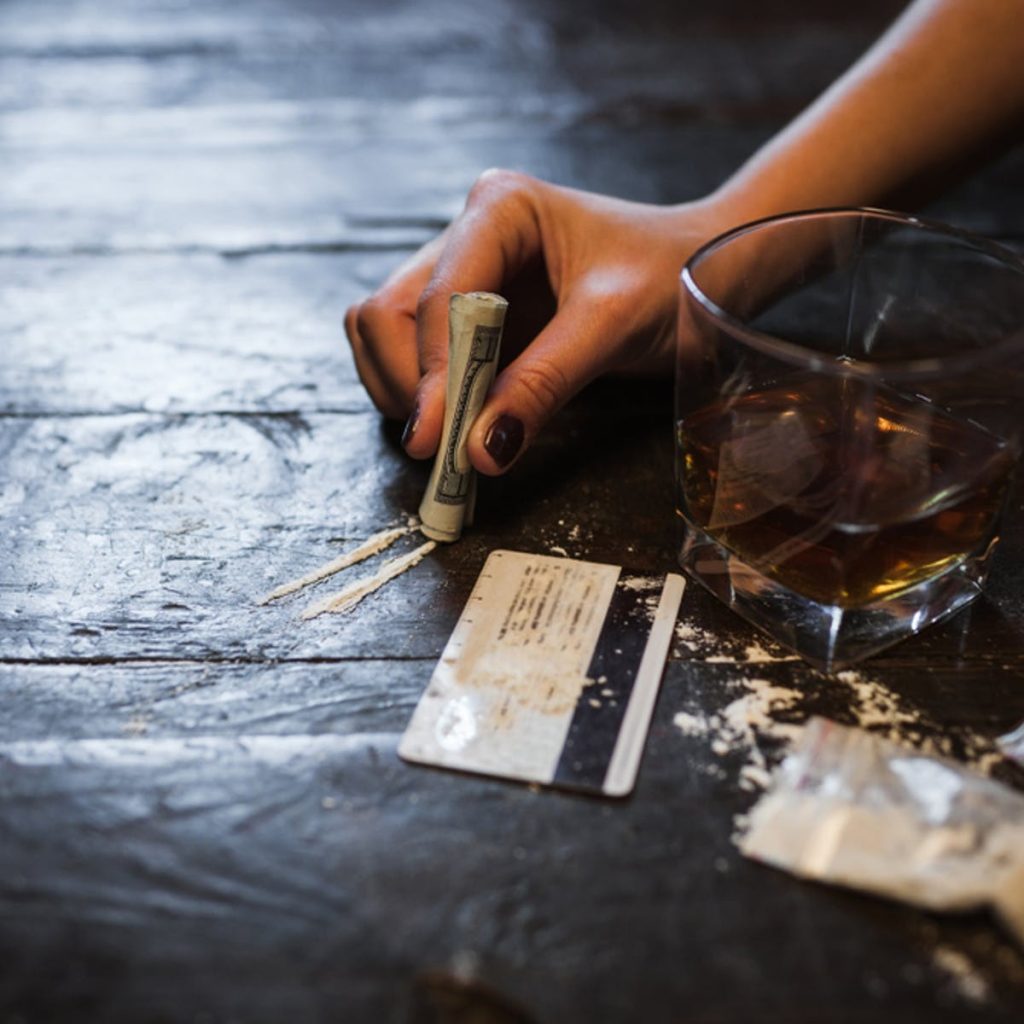The effects of mixing alcohol and drugs
Have you ever mixed alcohol with illicit drugs? Drank alcohol whilst on antibiotics, or combined alcohol with opiate pain medication?
Mixing alcohol and drugs, whether those drugs be prescribed, obtained from a pharmacy or are illicit, is considered very dangerous and can lead to immediate and life-threatening complications. Prevention is always better than cure. We hope that reading this article may help you identify if you have a problem or think twice before mixing alcohol and drugs.
It was registered by the Office of National Statistics (ONS) that in 2019 in England and Wales, 841 deaths were recorded as a result of a combination of alcohol and drugs.
Alcohol is harmful to mix with ANY drug. Here, we look at why combining alcohol and drugs is considered so dangerous, and the effects of mixing illicit drugs and medication with alcohol.
Alcohol and Cocaine
When alcohol and cocaine are combined, the liver produces a third, even more, addictive and potent drug known as cocaethylene. Cocaethylene takes longer to process and expel from the body than either substance alone. The toxic mix of alcohol and cocaine can be fatal for up to 12 hours after consuming them together.
The other substantial risk of combining alcohol and cocaine is that cocaine has the effect of sobering you up. This can lead to binging on both alcohol and cocaine for hours on end. This places immense stress on all of your organs and puts you at real risk of developing a dual addiction and dependence on both substances.
Alcohol and Heroin
Mixing alcohol and heroin is one of the most dangerous combinations of substance abuse. Both heroin and alcohol slow down your heart and respiratory rate, more than doubling your overdose risk when used together.
Combining even small amounts of alcohol leads to a lower tolerance for heroin, meaning that it will take less heroin to overdose than your body is normally used to.
| Statistics show that approximately three-quarters of deaths from heroin overdoses result from consuming alcohol at the same time. |
Alcohol and Ecstasy (MDMA, Molly, Mandy)
Both Ecstasy and alcohol are diuretics, combining both presents a real risk of dehydration due to stress on body temperature and the kidneys. Ultimately, this could lead to over-consumption of water or kidney failure.
In most ecstasy-related deaths, the victims have also been found to have alcohol in their system.
By combining alcohol and MDMA, at the very least, you will suffer from a more severe comedown the following day(s). At worst, you could well die from dehydration, heart failure or respiratory arrest (amongst other causes).
Combining both alcohol and Ecstasy is also likely to increase side effects such as nausea, risk-taking, confusion, and vomiting.
Alcohol and Amphetamines
Illicit amphetamines such as ‘Speed’ increase your heart rate, blood pressure and respiratory rate. Much like Ecstasy, they also act as a diuretic and appetite suppressant.
Using speed or another amphetamine will increase your body temperature, which can reach deadly levels when mixed with alcohol. Mixing alcohol and amphetamines also places immense strain on your brain and heart, putting you at far greater risk of a heart attack or stroke.
Both alcohol and amphetamines also reduce your inhibitions, making you more likely to engage in risky behaviour or behaviour that you later regret.
Combining alcohol with speed can also increase speed’s undesired side effects of anxiety, paranoia and aggression. Stimulants also cancel out the effect of feeling drunk as they make you more alert. This can lead to binge drinking and drinking to harmful levels.
The comedown of combining both alcohol and amphetamines is also intensified and prolonged.
Alcohol and Legal highs
Many Legal highs are now Illicit Class B drugs. This is due to their potential for abuse and dangerous effects. Legal highs have hallucinogenic effects, stimulant effects, depressant effects and psychoactive properties.

From something seemingly as innocuous as laughing gas to more sinister drugs such as Spice and Mephedrone, there is a legal high to suit everyone’s ‘desired high.’
Needless to say, mixing any legal high with alcohol really is a gamble on how it will affect you.
Legal highs can contain all manner of harmful chemicals. They are man-made in back street, unregulated laboratories. Combining legal highs with alcohol will only increase their toxicity and cause a potentially fatal interaction.
Combining any legal high and alcohol puts you at greater risk from everything, including increased sedation, vomiting, erratic and dangerous behaviour, cardiac arrest, multiple organ failure, respiratory arrest and death.
Alcohol and Cannabis

Combining alcohol and cannabis is very commonplace among regular drinkers.
The use of both cannabis and alcohol together is almost twice as high as using either drug alone.
Drinking and smoking cannabis together is associated with increased frequency and quantity of alcohol consumption.
Both alcohol and cannabis lower inhibitions and affect decision making. This doubles the risk of a person using both simultaneously, taking a life-threatening risk such as drink driving.
A person driving under the influence of alcohol and cannabis is also at a greater risk of causing or being involved in an accident. Both substances affect cognitive ability, distort senses and perception of time, and delay life-saving reactions.
Drinking with cannabis frequently also increases the risk to mental and physical health and increases social and occupational harms.
Mixing alcohol and prescription drugs
Drinking with prescription medications is the most common form of substance abuse. Numerous medications negatively interact with alcohol.

Many prescription drugs carry a black box warning label – Do not drink alcoholic beverages when taking this medication. Not everyone will adhere to this warning, especially if they suffer from an alcohol use disorder (AUD) or are taking a long-term prescription.
Alcohol and Flu remedies
There are many risks associated with drinking with over-the-counter medications such as flu remedies and cough medicines. Many cold & flu remedies and cough mixtures contain codeine, alcohol or diphenhydramine, all of which are dangerous to mix with other drugs.
Alcohol and Antibiotics
Even commonly prescribed medications such as antibiotics that seemingly have no sedative effects can cause dangerous and even fatal interactions when mixed with alcohol.
The side effects commonly associated with antibiotics and alcohol abuse, such as nausea and diarrhoea, are increased when the two are mixed.
Alcohol also lowers your immune system for 24 hours post-consumption, so it is likely that it will also take you longer to recover from your illness.
For these reasons, you should always avoid drinking whilst taking a course of antibiotic medication.

Alcohol and stimulant medications
Alcohol and stimulant medications, such as Adderall and Ritalin, are very harmful to combine.
The truth is combining alcohol and stimulant medications put a great strain on the brain and central nervous system, as one tries to speed up and the other tries to slow down.
Mixing stimulants and drinking also increases toxicity levels in the blood, putting you at higher risk of stroke, cardiac arrest and respiratory failure.
As each drug’s effects cancel each other out, you are also much more likely to drink more than you normally would. This increases all of the harmful effects associated with high-risk drinking.
Alcohol and opioids/opiates painkillers
Opiate and opioid medications are commonly prescribed drugs for the treatment of moderate to severe pain. They can also be purchased over the counter. Opioid drugs have similar effects to alcohol.
Common forms of opioid prescription medications include codeine, tramadol, oxycontin, methadone and morphine.
Over the counter medications that contain opiates include Co-codamol, Solpadeine Max, Nurofen Plus, and many cough mixtures (due to opiates containing cough suppressant properties).
Opiates can also be obtained illegally in the form of Heroin, a class A drug. The more potent the opiate, the higher the risk of overdose when mixing with alcohol.
This combination slows down the disposal of the chemicals from the body, resulting in increased toxicity levels, leading to overdose, respiratory depression, coma, and death.
Alcohol and gabapentinoids
Alcohol and gabapentinoids are a very dangerous mix—both work by suppressing the central nervous system and slowing down brain signalling.
Gabapentinoids such as Gabapentin and Pregabalin are often prescribed for anxiety and chronic nerve pain conditions.
Drinking whilst taking a gabapentinoid is very high risk and can lead to overdose, respiratory depression and death.
Alcohol and sleeping medications
Sedative drugs are often prescribed to treat sleep and anxiety disorders.
Z-list drugs and benzodiazepines are particularly dangerous to mix with alcohol.

Someone taking a sleeping medication may be more prone to use alcohol to enhance the medication’s sedative effects.
Sedatives and hypnotic medications act on the CNS (central nervous system) calming and slowing brain activity. Drinking and taking sedatives can easily lead to overdose, respiratory depression, coma and death.
Alcohol and antidepressants
Alcohol, when abused, causes dopamine levels to come crashing down. This is self-defeating when taking antidepressant medication which tries to stabilise the brain’s chemistry.
Chronic alcohol abuse leads to acute anxiety and depression. Drinking also negatively interacts with many antidepressants, and no amount is considered safe.
As they both have sedative properties, drinking with an antidepressant such as Mirtazapine can lead to overdose and death.
Fast and effective help for substance abuse
It is not uncommon for a person to be addicted to more than one substance. Sometimes a concoction of substances is involved.
Having an addiction to more than one substance increases all the associated risks and can be more complex to treat, especially in a community-based environment.
At Rehab Guide, we can successfully and effectively treat all manner of addictions, behavioural disorders and drug abuse problems. We have the expertise and resources to help you or a family member make a full and lasting recovery from any addiction.
Call us today to on 02072052845. We offer bespoke recovery solutions for complex problems and are here to help you every step of the way.
References:
Alcohol and the Immune system – Alcohol Research https://www.ncbi.nlm.nih.gov/pmc/articles/PMC4590612/
Alcohol and opioids – Possible interactions https://pubmed.ncbi.nlm.nih.gov/2821747/
Forensic drug profile – Cocaethylene https://pubmed.ncbi.nlm.nih.gov/30796807/
National Treatment Agency for Substance Abuse. HS, ‘Does the combined use of heroin or methadone and other substances increase the risk of overdose?’, 2007.
Mixing Alcohol and other drugs – NIDirect https://www.nidirect.gov.uk/articles/mixing-alcohol-other-drugs
Mephedrone and Alcohol interactions in humans – Pubmed PMC6999687
Simultaneous vs. concurrent use of alcohol and cannabis in the National Alcohol Survey PMC4399000
Jason has been writing expert articles and blog posts on issues related to addiction and mental health for Rehab Guide.
Jason has a BA in Psychology, a Masters of Social Work and is currently working on his doctorate in social work.


